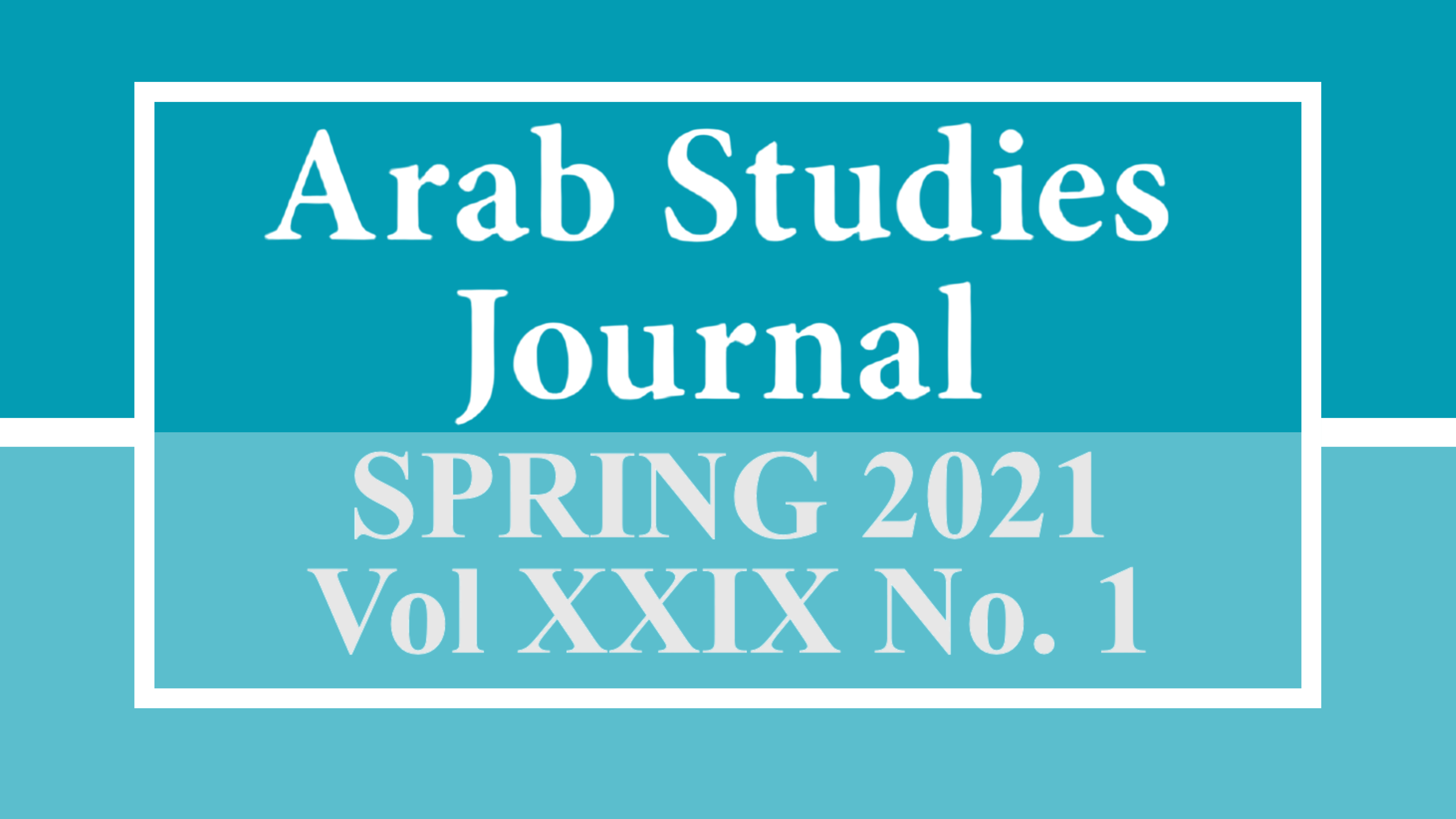Arab Studies Journal
Vol. XXIX, No. 1
Spring 2021
In this issue, we are proud to feature articles that explore the production and circulation of knowledge from diverse disciplines and approaches. In “Egyptian Textbooks in Times of Change, 1952–1980,” Farida Makar and Ehaab D. Abdou trace the production and transformation of historical met- anarratives within Egypt’s post-1952 educational bureaucracy. By exploring the bureaucracy as a site of knowledge production, they provide a nuanced portrait of the processes by which changing political contexts inform text- book content. In “Reconceptualizing Algeria in Italy: Amara Lakhous and Leonardo Sciascia,” Claudia Esposito argues that reading these two authors through a transcolonial lens can provide tools to decolonize studies of the Mediterranean. Developing Aldo Moro’s concept of converging parallels, Esposito reveals how Lakhous’s use of the giallo crime novel genre permits new kinds of readings of Algeria and the Maghrib, and new understand- ings of power, corruption, and memory that transcend the national frame. Esposito’s article is the first in a series of articles expounding new approaches to Maghrib studies, assembled by guest editor Brahim El Guabli, which will continue in Arab Studies Journal’s Fall 2021 issue. Finally, in “Arab Critical Culture and Its (Palestinian) Discontents after the Second World War,” Adey Almohsen historicizes the consolidation of a particular understanding of iltizam. By exploring specific Palestinian literary and cultural critics, Almohsen brings to the fore those writers that did not subscribe to that understanding or who otherwise wrote from a different set of concerns they viewed as central to the Palestinian reality. In doing so, Almohsen forces us to rethink the chronologies and categories that have emerged in the historiography to narrate Arab literary and critical output since the Nakba. We are equally proud, as always, to feature a robust and incisive collection of reviews examining the latest contributions to the interdisciplinary study of the Middle East and North Africa.
This Spring 2021 issue marks the third during the COVID-19 pandemic and the second of our co-editorship of Arab Studies Journal. We would like to acknowledge the volunteer labor of the entire editorial team and our network of anonymous reviewers. We are well aware of the burdens, stresses, and dislocations—not to mention physical and emotional toll—the pandemic has inflicted upon our articles, reviews, and administrative sections, both collectively and individually. That our team, external reviewers, and authors have maintained their commitments to Arab Studies Journal and its publication cycle during this difficult time is something we hold dear and do not take for granted. Our success as a journal reflects this joint commitment, even if the responsibility for any shortcomings are our own as co-editors.
TABLE OF CONTENTS
Articles
8. Egyptian Textbooks in Times of Change, 1952–1980
Farida Makar and Ehaab D. Abdou
38. Reconceptualizing Algeria in Italy: Amara Lakhous and Leonardo Sciascia
Claudia Esposito
56. Arab Critical Culture and Its (Palestinian) Discontents after the Second World War
Adey Almohsen
Reviews
84. Spiritual Subjects: Central Asian Pilgrims and the Ottoman Hajj at the End of Empire by Lâle Can
Reviewed by Vladimir Hamed-Troyansky
89. Popular Fiction, Translation and the Nahda in Egypt by Samah Selim
Reviewed by Adéla Provazníková
94. Feminism and Avant-Garde Aesthetics in the Levantine Novel by Kifah Hanna
Reviewed by Rachel Green
99. Sex, Law, and Sovereignty in French Algeria, 1830-1930 by Judith Surkis
Reviewed by Darcie Fontaine
104. Mobilizing Memory: The Great War and the Languages of Politics in Colonial Algeria, 1918-39 by Dónal Hassett
Reviewed by Jim House
109. L’Algérie face à la catastrophe suspendue. Gérer la crise et blâmer le peuple sous Bouteflika (1999–2014) by Thomas Serres
Reviewed by Ratiba Hadj-Moussa
114. The Dynamics of Exclusionary Constitutionalism: Israel as a Jewish and Democratic State by Mazen Masri
Reviewed by Raef Zreik
118. Revolution and Disenchantment: Arab Marxism and the Binds of Emancipation by Fadi A. Bardawil
Reviewed by Nate George
